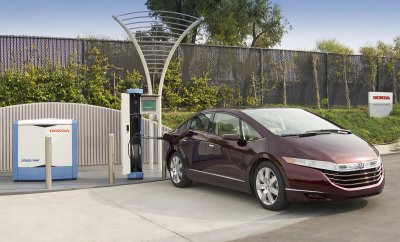Here's a better idea: Let them suffer. The crisis these companies face can be divided into two main problem areas: Management and Unions.
Management
It would be hard to imagine a company losing Billions of dollars for many quarters in a row and two or three years after having consecutive negative quarters beginning to respond with changes to structure and product design. The Big Three have done just that.
What did Ford and GM focus on while gas prices where skyrocketing? They were producing and actually expanding SUV production. Now they claim that somehow it is the economic climate that is causing their losses and they claim it is foreign competition that is adding to their woes. That's like wondering why the sidewalk lemonade stand doesn't do so well in winter and then blaming the lack of lemonade sales on the fact that there is a Starbucks 10 feet away.
Of course gas prices affect Auto sales, even Toyota had some losses last quarter (in the US) and it is also obvious that competition makes it more difficult for a company to sell the same product and have the consumer buy it without thinking. The management at the Big Three always seem to have their eyes on Washington for a handout ever since they decided that American consumers wouldn't trust new Japanese cars that came flooding into the US in the 70's when gas prices were sky high and they couldn't stop making gas guzzling boat-cars. It is true that American consumers like buying products that are made in America and have brand-name allegiance but there is a limit. The companies had fair warning that quotas on foreign cars were going out the window and should have gotten the message when "foreign" vehicle plants started popping up in the South and now have 100% American labor. These big company executives just refuse to believe that their reality from 1965 has changed.
These management executives have to realize a few things. 1) American consumers are smart, they will buy the best vehicle for their needs no matter how many million dollars is spent on researching a trendy model name. 2) Making a bad product should not make you eligible for a handout. 3) Unlike banks, if you fail there are plenty of other companies that can pick up the slack, there is no Auto Tsunami in the making. 4) React to the economy, don't sit around and wait until it beats you to death. 5) Deal with the Unions (UAW), they are sucking your carcass dry.
Unions
Bargaining organizations are an important part of the advocacy of blue-collar workers. Unions also played an important part in the fight against oppressive businesses and the politicians that were in Big Business's pockets. There.. proof I do not hate unions.
Now, moving on to the UAW (United Auto Workers), the union dealing with the the Auto companies in question. The UAW is largely corrupt and has turned from an advocacy group to a group that seeks to feed itself by extortion. This union isn't working for the true interests of workers it is making moves and spreading misinformation amongst those who may not know as much as them in order to cause walkouts and strikes. The effect of this being the UAW is extremely powerful and of course.. that means they want more. The UAW keeps finding the weakest points of the Big Three and then making sure they pay dearly before their workers return to the line.
The sad part of this setup is that it is the workers that are being hurt. First they lose wages when they are not working then they go back to work feeling better but without receiving any substantial increase in meaningful work benefits or work conditions. Meanwhile the unions gain more clout and more memberships.. They ought to change their title to UAE - United for Auto Extortion.
Conclusion
Democrats, no doubt, have a debt of gratitude to pay to Unions who endorsed them and made sure their members turned out in large numbers for their candidates but it is time to stand up to corrupt unions and failing big businesses and say "Help doesn't mean handouts!"




